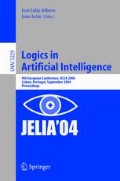Abstract
Results in social choice theory such as the Arrow and Gibbard-Satterthwaite theorems constrain the existence of rational collective decision making procedures in groups of agents. The Gibbard-Satterthwaite theorem says that no voting procedure is strategy-proof. That is, there will always be situations in which it is in a voter’s interest to misrepresent its true preferences i.e., vote strategically. We present some properties of strategic voting and then examine – via a bimodal logic utilizing epistemic and strategizing modalities – the knowledge-theoretic properties of voting situations and note that unless the voter knows that it should vote strategically, and how, i.e., knows what the other voters’ preferences are and which alternate preference P′ it should use, the voter will not strategize. Our results suggest that opinion polls in election situations effectively serve as the first n–1 stages in an n stage election.
Access this chapter
Tax calculation will be finalised at checkout
Purchases are for personal use only
Preview
Unable to display preview. Download preview PDF.
References
Arrow, K.J.: Social choice and individual values, 2nd edn. Wiley, New York (1963)
Benoit, J.-P.: Strategic manipulation in games when lotteries and ties are permitted. Journal of Economic Theory 102, 421–436 (2002)
Bonanno, G.: Modal logic and game theory: two alternative approaches. Risk Decision and Policy 7, 309–324 (2002)
Brams, S.J.: Voting Procedures. In: Handbook of Game Theory, vol. 2, pp. 1055–1089. Elsevier, Amsterdam (1994)
Brams, S.J., Fishburn, P.C.: Voting Procedures. In: Handbook of Social Choice and Welfare, North-Holland, Amsterdam (1994)
Everaere, P., Konieczny, S., Marquis, P.: On merging strategyproofness. In: Proceedings of KR 2004, Morgan Kaufmann, San Francisco (2004)
Gibbard, A.: Manipulation of Voting Schemes: A General Result. Econometrica 41(4), 587–601 (1973)
Harrenstein, P., van der Hoek, W., Meyer, J.-J., Witteveen, C.: A modal characterization of nash equilibira. Fundamenta Informaticae 57(2-4), 281–321 (2002)
Konieczny, S., Pino-Pérez, R.: On the logic of merging. In: Cohn, A.G., Schubert, L., Shapiro, S.C. (eds.) Principles of Knowledge Representation and Reasoning: Proceedings of the Sixth International Conference (KR 1998), pp. 488–498. Morgan Kaufmann, San Francisco (1998)
Lomuscio, A., Sergot, M.: Deontic interpreted systems. Studia Logica 75 (2003)
Maynard-Zhang, P., Lehmann, D.: Representing and aggregating conflicting beliefs. Journal of Artificial Intelligence 19, 155–203 (2003)
Maynard-Zhang, P., Shoham, Y.: Belief fusion: Aggregating pedigreed belief states. Journal of Logic, Language and Information 10(2), 183–209 (2001)
Meyer, T., Ghose, A., Chopra, S.: Social choice theory, merging and elections. In: Benferhat, S., Besnard, P. (eds.) ECSQARU 2001. LNCS (LNAI), vol. 2143, p. 466. Springer, Heidelberg (2001)
Pacuit, E., Parikh, R.: A logic of communication graphs. In: Leite, J., Omicini, A., Torroni, P., Yolum, p. (eds.) DALT 2004. LNCS (LNAI), vol. 3476, pp. 256–269. Springer, Heidelberg (2005)
Parikh, R.: Social software. Synthese 132 (2002)
Parikh, R., Pacuit, E., Cogan, E.: The logic of knowledge based obligations. In: Leite, J., Omicini, A., Torroni, P., Yolum, p. (eds.) DALT 2004. LNCS (LNAI), vol. 3476, pp. 256–269. Springer, Heidelberg (2005)
Satterthwaite, M.: The Existence of a Strategy Proof Voting Procedure: a Topic in Social Choice Theory. PhD thesis, University of Wisconsin (1973)
van Benthem, J.: Rational dynamics and epistemic logic in games. Technical report, ILLC (2003)
Author information
Authors and Affiliations
Editor information
Editors and Affiliations
Rights and permissions
Copyright information
© 2004 Springer-Verlag Berlin Heidelberg
About this paper
Cite this paper
Chopra, S., Pacuit, E., Parikh, R. (2004). Knowledge-Theoretic Properties of Strategic Voting. In: Alferes, J.J., Leite, J. (eds) Logics in Artificial Intelligence. JELIA 2004. Lecture Notes in Computer Science(), vol 3229. Springer, Berlin, Heidelberg. https://doi.org/10.1007/978-3-540-30227-8_5
Download citation
DOI: https://doi.org/10.1007/978-3-540-30227-8_5
Publisher Name: Springer, Berlin, Heidelberg
Print ISBN: 978-3-540-23242-1
Online ISBN: 978-3-540-30227-8
eBook Packages: Springer Book Archive

